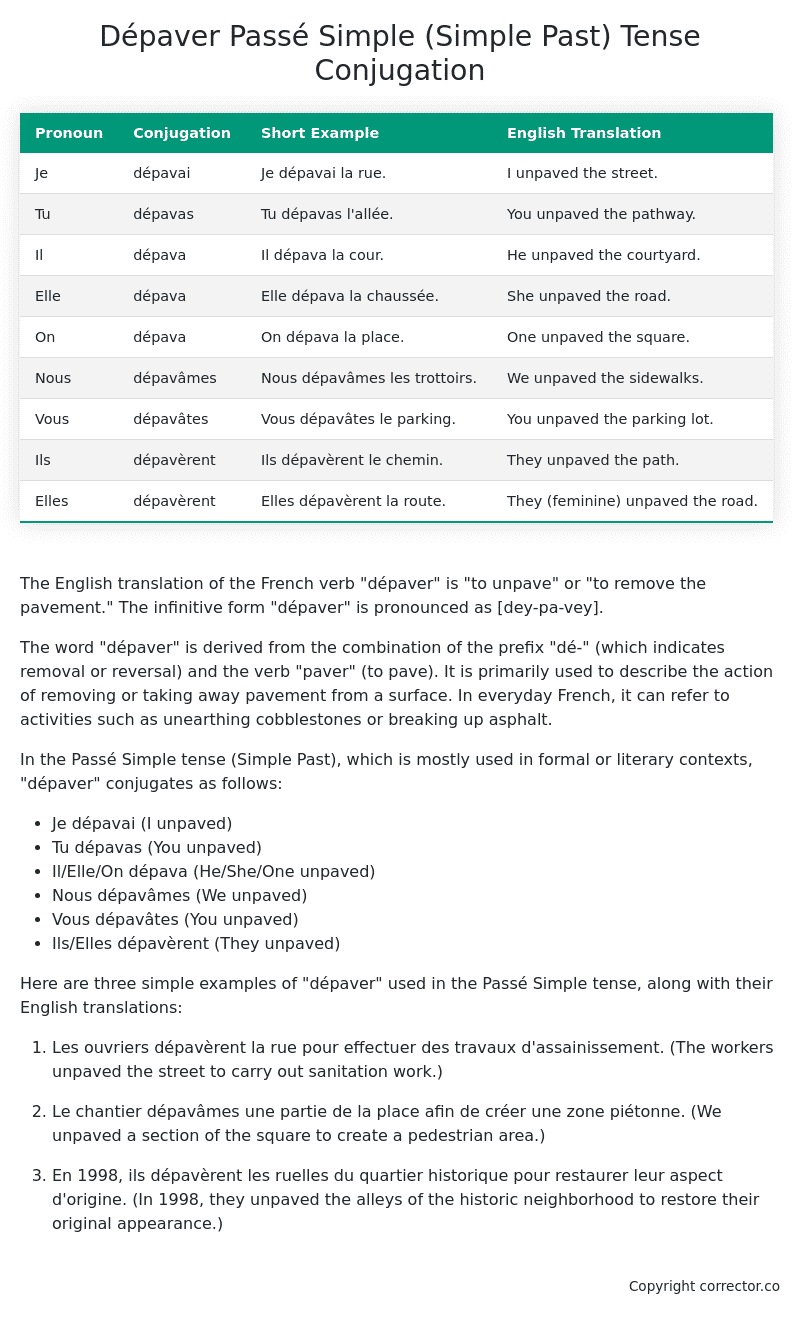Passé Simple (Simple Past) Tense Conjugation of the French Verb dépaver
Introduction to the verb dépaver
The English translation of the French verb “dépaver” is “to unpave” or “to remove the pavement.” The infinitive form “dépaver” is pronounced as [dey-pa-vey].
The word “dépaver” is derived from the combination of the prefix “dé-” (which indicates removal or reversal) and the verb “paver” (to pave). It is primarily used to describe the action of removing or taking away pavement from a surface. In everyday French, it can refer to activities such as unearthing cobblestones or breaking up asphalt.
In the Passé Simple tense (Simple Past), which is mostly used in formal or literary contexts, “dépaver” conjugates as follows:
- Je dépavai (I unpaved)
- Tu dépavas (You unpaved)
- Il/Elle/On dépava (He/She/One unpaved)
- Nous dépavâmes (We unpaved)
- Vous dépavâtes (You unpaved)
- Ils/Elles dépavèrent (They unpaved)
Here are three simple examples of “dépaver” used in the Passé Simple tense, along with their English translations:
-
Les ouvriers dépavèrent la rue pour effectuer des travaux d’assainissement.
(The workers unpaved the street to carry out sanitation work.) -
Le chantier dépavâmes une partie de la place afin de créer une zone piétonne.
(We unpaved a section of the square to create a pedestrian area.) -
En 1998, ils dépavèrent les ruelles du quartier historique pour restaurer leur aspect d’origine.
(In 1998, they unpaved the alleys of the historic neighborhood to restore their original appearance.)
Table of the Passé Simple (Simple Past) Tense Conjugation of dépaver
| Pronoun | Conjugation | Short Example | English Translation |
|---|---|---|---|
| Je | dépavai | Je dépavai la rue. | I unpaved the street. |
| Tu | dépavas | Tu dépavas l’allée. | You unpaved the pathway. |
| Il | dépava | Il dépava la cour. | He unpaved the courtyard. |
| Elle | dépava | Elle dépava la chaussée. | She unpaved the road. |
| On | dépava | On dépava la place. | One unpaved the square. |
| Nous | dépavâmes | Nous dépavâmes les trottoirs. | We unpaved the sidewalks. |
| Vous | dépavâtes | Vous dépavâtes le parking. | You unpaved the parking lot. |
| Ils | dépavèrent | Ils dépavèrent le chemin. | They unpaved the path. |
| Elles | dépavèrent | Elles dépavèrent la route. | They (feminine) unpaved the road. |
Other Conjugations for Dépaver.
Le Present (Present Tense) Conjugation of the French Verb dépaver
Imparfait (Imperfect) Tense Conjugation of the French Verb dépaver
Passé Simple (Simple Past) Tense Conjugation of the French Verb dépaver (You’re reading it right now!)
Passé Composé (Present Perfect) Tense Conjugation of the French Verb dépaver
Futur Simple (Simple Future) Tense Conjugation of the French Verb dépaver
Futur Proche (Near Future) Tense Conjugation of the French Verb dépaver
Plus-que-parfait (Pluperfect) Tense Conjugation of the French Verb dépaver
Passé Antérieur (Past Anterior) Tense Conjugation of the French Verb dépaver
Futur Antérieur (Future Anterior) Tense Conjugation of the French Verb dépaver
Subjonctif Présent (Subjunctive Present) Tense Conjugation of the French Verb dépaver
Subjonctif Passé (Subjunctive Past) Tense Conjugation of the French Verb dépaver
Subjonctif Imparfait (Subjunctive Imperfect) Tense Conjugation of the French Verb dépaver
Subjonctif Plus-que-parfait (Subjunctive Pluperfect) Tense Conjugation of the French Verb dépaver
Conditionnel Présent (Conditional Present) Tense Conjugation of the French Verb dépaver
Conditionnel Passé (Conditional Past) Tense Conjugation of the French Verb dépaver
Conditionnel Passé II (Conditional Past II) Tense Conjugation of the French Verb dépaver
L’impératif Présent (Imperative Present) Tense Conjugation of the French Verb dépaver
L’impératif Passé (Imperative Past) Tense Conjugation of the French Verb dépaver
L’infinitif Présent (Infinitive Present) Tense Conjugation of the French Verb dépaver
L’infinitif Passé (Infinitive Past) Tense Conjugation of the French Verb dépaver
Le Participe Présent (Present Participle) Tense Conjugation of the French Verb dépaver
Le Participe Passé (Past Participle) Tense Conjugation of the French Verb dépaver
Struggling with French verbs or the language in general? Why not use our free French Grammar Checker – no registration required!
Get a FREE Download Study Sheet of this Conjugation 🔥
Simply right click the image below, click “save image” and get your free reference for the dépaver Passé Simple tense conjugation!

Dépaver – About the French Passé Simple (Simple Past) Tense
Formation
Usage
Narration
Historical Context
Interactions with other tenses
Passé Composé
Imparfait
Conditional and Subjunctive
Summary
I hope you enjoyed this article on the verb dépaver. Still in a learning mood? Check out another TOTALLY random French verb conjugation!


